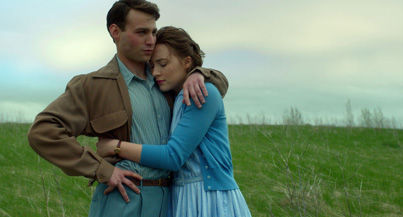If I Were an Academy Member: Ben Gruchow
By Ben Gruchow
February 27, 2016
5) Bridge of Spies
Bridge of Spies is a thoroughly respectable and well-constructed probe on one of my favorite themes: the manipulation of a person's identity to serve a narrative, in one direction or another. It's also pretty thoroughly unexciting in how it goes about this and where that probe ultimately ends up, with a third-act development that starts to feel in hindsight like a plot device intruding on the more natural character and story beats, like writers Matt Charman and the Coen brothers and director Steven Spielberg knew where they needed to end up and what they wanted to say but couldn't quite work out how to get there in time. It is a minor speed bump, for that, and the movie's stance on identity - and the politics of negotiation - are shot through with an elegance we can be grateful for if not especially surprised by. The same logic extends to the movie's look, which does nothing new with the cinematic techniques that Spielberg and cinematographer Janusz Kaminski have developed over the last couple of decades…but that lack of novelty is presented with such evocative, moody stateliness that I feel like a churl for even mentioning it in a mildly negative way.
4) Spotlight
Possibly the most mechanically precise film of the year, Spotlight is about a specialized department of the Boston Globe that picks up the trail of a story about child abuse and deception in the Catholic archdiocese of Boston. The movie knows what conclusions to draw decisively - like the practice by the Church of burying each instance of abuse as it occurs - and which elements are more complicated and tragic, providing us with a story about victims and perpetrators that is several degrees more effective and textured than the basic storyline might lead us to believe. This is deeply disturbing story material, but we are not pressed or led to draw simple conclusions from it, and the movie's quiet insistence on exploring ethics, and how traumatic incidents affect everyone who comes in contact with them, feels exactly right.
3) The Revenant
I saw The Revenant with a friend, and while we were discussing our reactions to it walking out of the theater, I noted that it was a surprisingly intimate film for one with so vast a canvas. That more or less saves the movie from itself, because it's not very deep as a character study. We are, more or less, watching 155 minutes of someone trying to survive the physical duress of this challenge, and that challenge, and this danger and that danger. When you really dig for it, you can extract some light theme about how arbitrary the line is between survivalism and villainy, but it's barely there.
What is there, in spades, is the movie's physical reality. The new, IMAX-resolution equivalent Arri Alexa 65 was used for this film, and it's a perfect showcase for the future of digital cinematography, but what really sets The Revenant apart is the evident scope of the movie's setting - shot mostly on-location, in desolate mountain and prairie territory in the dead of winter - and the striking creative decision to shoot most of the key scenes using nothing but natural light. This is a move that's virtually guaranteed to create an arduous production experience-but director Alejandro González Iñárritu, working with established long-take cinematographer Emmanuel Lubezki on a fixed focal length for (if I'm not mistaken) the entire film, creates a tactile, immediate reality on an incomprehensibly huge scale; it's a singular visual experience.
Continued:
1
2
3
|
|
|
|




